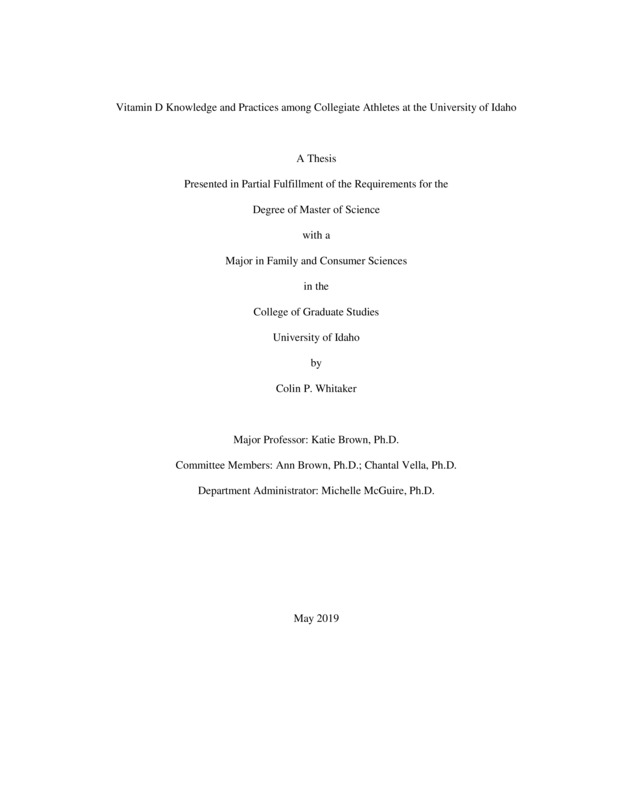Vitamin D Knowledge and Practices among Collegiate Athletes at the University of Idaho
Whitaker, Colin. (2019-05). Vitamin D Knowledge and Practices among Collegiate Athletes at the University of Idaho. Theses and Dissertations Collection, University of Idaho Library Digital Collections. https://www.lib.uidaho.edu/digital/etd/items/whitaker_idaho_0089n_11588.html
- Title:
- Vitamin D Knowledge and Practices among Collegiate Athletes at the University of Idaho
- Author:
- Whitaker, Colin
- Date:
- 2019-05
- Program:
- Family and Consumer Sciences
- Subject Category:
- Nutrition
- Abstract:
-
Vitamin D is a fat-soluble micronutrient that is responsible for many biological processes in the human body. Vitamin D is directly responsible for enhancing calcium absorption, which strengthen bones and reduce the risk for skeletal injury. Vitamin D also plays a role in the immune system and skeletal muscle activity. All of these factors play a significant role in the optimal health and performance of student-athletes. With limited food sources, and specific wavelengths of UVB needed for synthesis, athletes living in northern geographic locations are at risk of vitamin D deficiency.
At the time of this study, no existing vitamin D questionnaires had been tested for reliability or validity for use among collegiate athletes. Therefore, a survey was developed using some questions from previous research regarding vitamin D knowledge (Walker et al., 2014; Kung et al., 2006). A two-part testing sequence was performed in order to first assess the most appropriate question format, followed by the testing for reliability. A test-retest sequence allowed researchers to deem the questionnaire statistically reliable with Kappa values for each question ranging of 0.73-0.97.
Thirty-two student-athletes at the University of Idaho were participants in the vitamin D knowledge assessment. Results suggested that athletes had limited knowledge regarding vitamin D. Only 34% correctly listed food sources of vitamin D, 18% correctly listed health benefits and 34% correctly listed factors that affected vitamin D status. Surprisingly, 96% of athletes had knowledge of non-food sources of vitamin D. A majority of the athletes reported never taking a multivitamin (50%), vitamin D supplement (81%) or fish oil supplement that contained vitamin D (87%).
Of the twenty-four athletes who had their vitamin D plasma levels tested, 92%were classified as having inadequate or deficient serum vitamin D levels. There was no relationship (p = .446) between vitamin D knowledge and serum vitamin D levels among athletes at the University of Idaho.
- Description:
- masters, M.S., Family and Consumer Sciences -- University of Idaho - College of Graduate Studies, 2019-05
- Major Professor:
- Brown, Katie
- Committee:
- Brown, Ann; Vella, Chantal
- Defense Date:
- 2019-05
- Identifier:
- Whitaker_idaho_0089N_11588
- Type:
- Text
- Format Original:
- Format:
- application/pdf
- Rights:
- In Copyright - Educational Use Permitted. For more information, please contact University of Idaho Library Special Collections and Archives Department at libspec@uidaho.edu.
- Standardized Rights:
- http://rightsstatements.org/vocab/InC-EDU/1.0/

